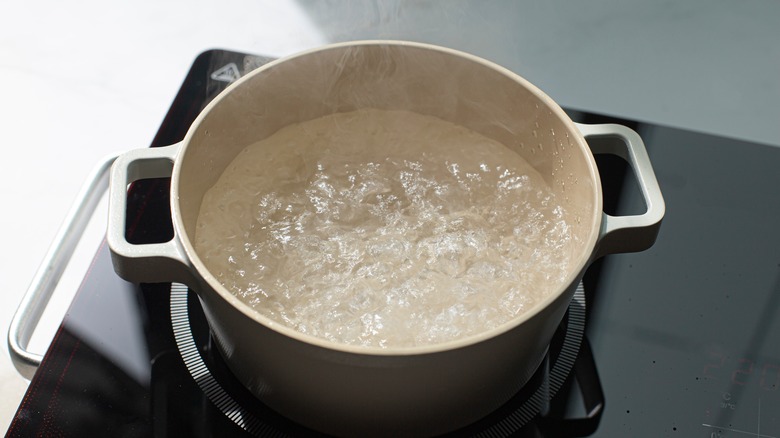Are There Benefits To Boiling Dirty Laundry? Here's What We Know
Hot water vs. cold water for laundry — it's a debate we've all heard before. But what about boiling your dirty clothes? Instead of heating a large pot for dinner, it's for your socks. This is not a new concept — during the medieval times, boiling laundry was a common practice. Nowadays, people are boiling their dirty garbs to ensure a deep clean and dead germs. However, while the intense heat can eliminate pests and bacteria, it's not a recommended practice. With modern washing machines and detergent, the process of boiling your laundry is excessive, environmentally unfriendly, and damaging to your clothes.
We understand the appeal to boiling your dirty laundry because it can kill bacteria and viruses. That can be a great plus for cleaning kitchen aprons covered with food spatter or pillowcases soaked in drool. But there's a reason you don't see boiling water in our ultimate guide to laundry water temperatures — it comes with way more downsides than benefits. In the end, your clothing might be germ-free, but they'll also be damaged.
Boiling dirty laundry can kill bacteria, but it's a damaging process
While boiling your dirty laundry might seem like an easy hack to deep clean your clothing, it can make matters worse. Boiling water can set protein-based stains like blood and sweat, so instead of deep-cleaning, you'll be deep-staining. Furthermore, delicate fabrics made from wool, silk, and elastic fibers can warp or even melt from the high temperatures. You should especially avoid boiling laundry that is labeled dry-clean only or cold-wash only. And although cotton and linen aren't as delicate, they can still fade or shrink when washed this way.
Besides, you don't need to boil your dirty laundry to kill germs — regular hot water will do the trick. Sanitizing clothing, eliminating odors-causing bacteria, and removing stains are some of the benefits to washing your laundry in hot water. It will have the same effect as the boiled water, but without subjecting your items to serious damage. Some stains — like blood and toothpaste — even require cold water, while things like sweat need both.
Another reason to leave the piping hot laundry in the medieval times is sustainability. Boiling dirty laundry is not the best for the environment. It requires more energy to heat the H2O, leaving a larger carbon footprint than if you washed in warm or cold water. And as we now know, there are no added benefits to the extra energy it takes to go from warm water to boiling. So skipping this hack is a simple tip for an eco-friendly laundry day where you don't have to worry about melting clothes.

